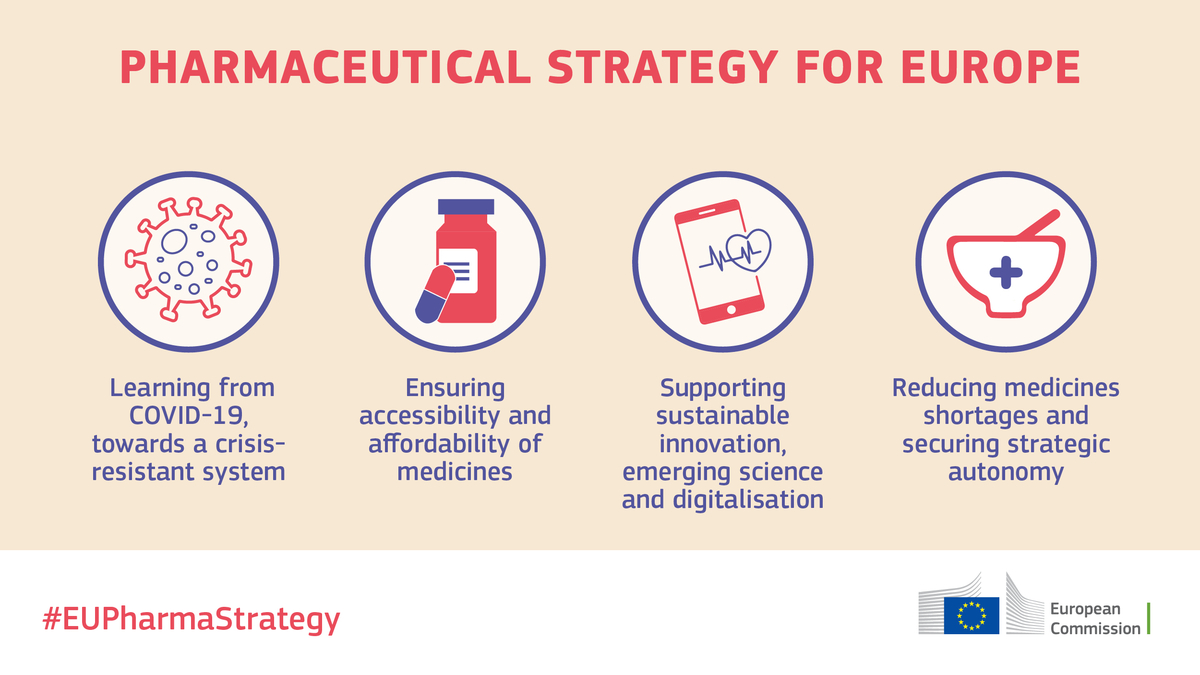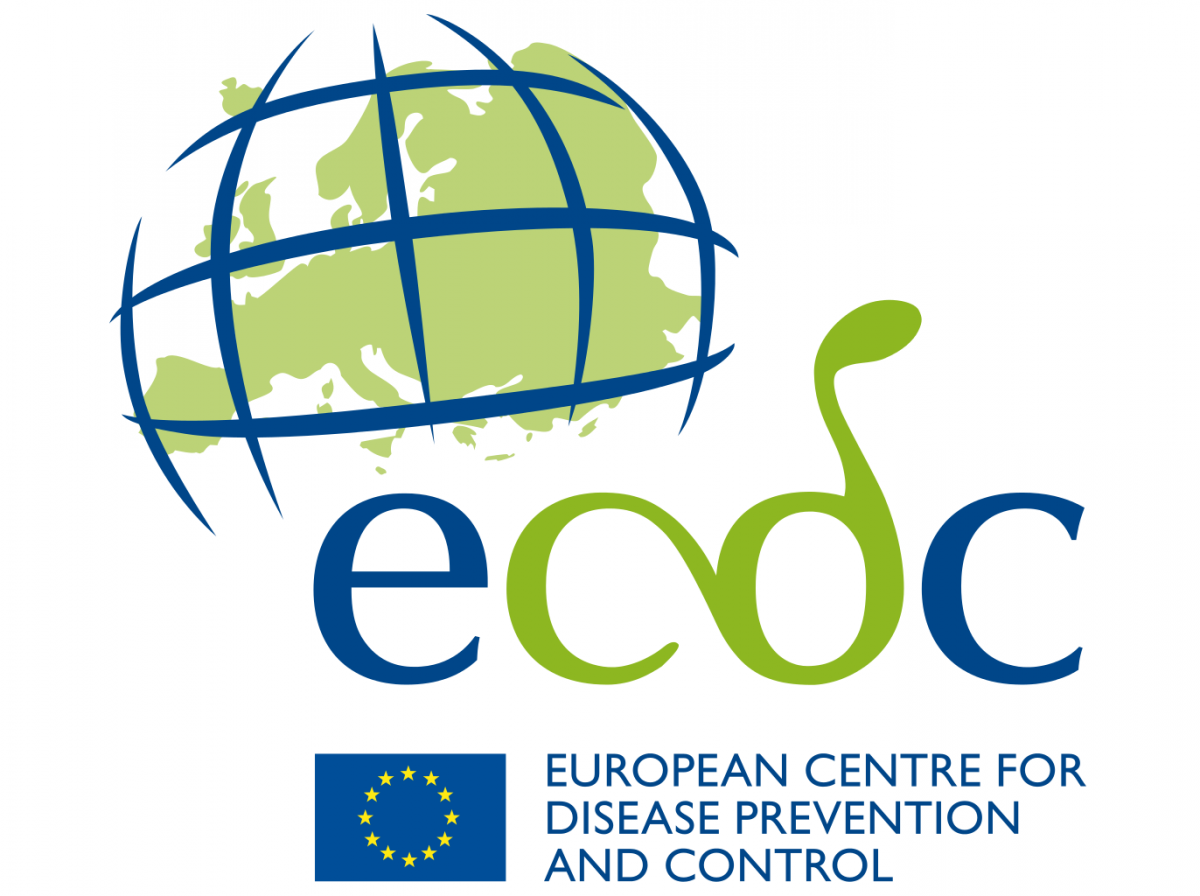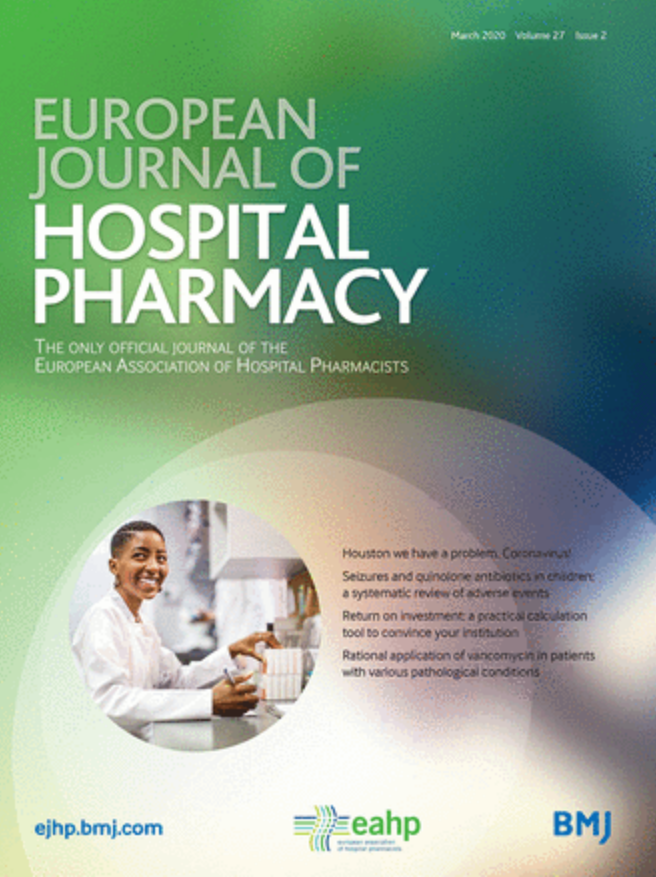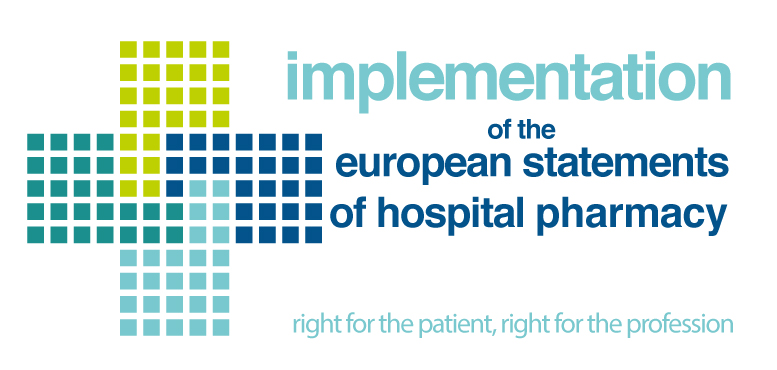EU MONITOR - 2019 Medicines Shortages Survey
The EAHP EU Monitor is a regular round up of news relevant to hospital pharmacy in Europe.
You can subscribe to receive the EAHP EU Monitor by email HERE.
Results of EAHP’s 2019 Medicines Shortages Survey published in the EJHP
 The online first edition of the European Journal of Hospital Pharmacy (EJHP) has published an original article showcasing the results of the 2019 Medicines Shortages Survey of the European Association of Hospital Pharmacists (EAHP).
The online first edition of the European Journal of Hospital Pharmacy (EJHP) has published an original article showcasing the results of the 2019 Medicines Shortages Survey of the European Association of Hospital Pharmacists (EAHP).
EAHP’s 2019 Medicines Shortages Survey aimed at collecting information on reasons and management strategies for medicines shortages as well as details on their impact on patients. The survey targeted hospital pharmacists and for the first time physicians, nurses and other healthcare professionals. A separate set of questions addressed patients. The 28-question survey ran from 7 November 2019 to 13 January 2020. It’s results showed that medicines shortages affect patient care and healthcare professionals’ everyday tasks. Better enforcing of the mandatory early notification of shortages and structured mitigation response were recognised by all respondents as best strategy to tackle shortages.
Read the EJHP article HERE
Access the full 2019 Medicines Shortages Report HERE
Submit your video showcasing clinical and hospital pharmacy services for COVID-19 patients

Together with the European Society of Clinical Pharmacy (ESCP), EAHP is collecting best practice examples of clinical and hospital pharmacy services that made a difference for patients during the COVID-19 pandemic.
Both Associations are encouraging clinical and hospital pharmacist to record short 2 to 3-minute videos showcasing their COVID-19 interventions. The recorded activities don’t have to be very innovative or complex. They should simply show what types of clinical or hospital pharmacy services were provided during the pandemic for patients or how these services are being carried out. There are no limitations apart from the fact that the video should fulfil minimum graphical quality standards and that is should be non-commercial and respect ethical and privacy standards.
By 15 June, please submit your short video via we-transfer (https://wetransfer.com/) to covid19[at]eahp[dot]eu and international.office[at]escpweb[dot]org.
More information about the video initiative is available HERE
Roadmap pharmaceutical strategy consultation

Last week, the European Commission released its roadmap for an new EU Strategy on safe and affordable medicines which seeks to improve and accelerate patients’ access and to support innovation in the EU pharmaceutical industry.
The roadmap outlines the intentions of the strategy which will be published in the fourth quarter of 2020. The strategy aims to tackle issues linked to medicines shortages and unequal access to medicines, the fact that innovation might not always be in line with the public health need and the way environmental risks are addressed. In addition, it will look at the innovation ecosystem of the pharmaceutical industry in Europe as well as regulatory barriers to innovation. Specific legislative and non-legislative measures will be evaluated to
- Ensure greater access and availability of pharmaceuticals to patients;
- Ensure affordability of medicines for patients and health systems financial and fiscal sustainability;
- Enable innovation including for unmet medical needs in a way that harnesses the benefits of digital and emerging science and technology and reduces the environmental footprint; and,
- Support EU influence and competitiveness on the global level, reduce direct dependence on manufacturing in non-EU countries, seek a level playing field for EU operators.
Roadmaps, such as the one on the pharmaceutical strategy, are open for feedback for 4 weeks. Feedback will be taken into account for further development and fine tuning of the initiative. The European Commission will summarise the input received in a synopsis report explaining how the input will be taken on board and, if applicable, why certain suggestions can't be taken up. Feedback to the roadmap can be shared until 7 July 2020.
Access the roadmap consultation HERE
ECDC celebrates anniversary
 The end of May marked the 15th anniversary of the European Centre for Disease Prevention and Control (ECDC). Set up after the SARS outbreak, ECDC has been fighting against communicable diseases and working together with all member countries in the European Union and the European Economic Area to better respond to public health threats and emerging diseases.
The end of May marked the 15th anniversary of the European Centre for Disease Prevention and Control (ECDC). Set up after the SARS outbreak, ECDC has been fighting against communicable diseases and working together with all member countries in the European Union and the European Economic Area to better respond to public health threats and emerging diseases.
Key areas of work include vaccination coverage, combatting antimicrobial resistance and the elimination of viral hepatitis. In addition, ECDC is collaborating closely with international partners, such as the European Commission, the European Parliament and the European Neighbourhood Policy countries.
Learn more HERE
Updates from the European Medicines Agency

The European Medicines Agency (EMA) published new communications linked to the COVID-19 pandemic. These touch on EU actions to support the availability of medicines and the risks of chloroquine and hydroxychloroquine.
Update on EU actions to support availability of medicines during COVID-19 pandemic
The EU Executive Steering Group on Shortages of Medicines Caused by Major Events held a virtual meeting on 3 June 2020. Regular participation in the meeting of the steering group was extended to all the heads of the national competent authorities (NCAs) of the EU Member States to discuss the measures taken by EU authorities to ensure the continued availability of medicines in Europe during the ongoing COVID-19 pandemic.
In order to prepare for a potential second wave of coronavirus infections and to ensure that patients in Europe will have access to crucial medicines, the extended steering group continued to discuss how to improve the forecasting of future demand of medicines used in intensive care units (ICUs) and of other medicines and how to better match the estimated demand with the available supply.
The steering group agreed to further improve the collection of demand data, taking into account best practices at national level, and to subsequently share these data within the European Medicines Regulatory Network. For this purpose, it was decided that EMA will establish an ad hoc working group that will be tasked with the development of a common framework for collecting and sharing demand data in the EU/EEA, in view of a possible next wave of the current COVID-19 pandemic in the autumn. The ad hoc group on forecasting demand data in the EU/EEA will also determine which medicines will be included in this exercise, which might go beyond ICU medicines, and will define adequate metrics for data collection at EU level. The new group will comprise experts nominated by the NCAs and have a limited time duration.
The extended steering group will decide on the final composition of the ad hoc working group at its next meeting. The new working group is expected to develop a reflection paper summarising best practices from national forecasting models and providing practical recommendations for a harmonised approach.
More information is available HERE
COVID-19: reminder of the risks of chloroquine and hydroxychloroquine
Both chloroquine and hydroxychloroquine, which are authorised for malaria and certain autoimmune diseases, have been used to treat patients with COVID-19 but their beneficial effects in this patient population are not established. Several observational studies in COVID-19 have reported that chloroquine and hydroxychloroquine are associated with an increased risk of heart problems, a well-known side effect of such treatments, including cardiac arrhythmias and cardiac arrest.
When prescribing these medicines, healthcare professionals should take into account pre-existing heart conditions, uncorrected potassium or magnesium imbalance, and concomitant use with medicines that prolong the QT interval as these factors may make patients more prone to heart rhythm disorders. Healthcare professionals should also note that heart rhythm disorders may be more likely or be more severe if chloroquine or hydroxychloroquine are used at higher doses than those recommended for their authorised indications or if they are combined with certain antibiotics such as azithromycin. EMA has previously communicated on these risks.
In view of the emerging data, some EU countries have suspended or stopped clinical trials investigating chloroquine and hydroxychloroquine in COVID-19 patients. For some trials, including WHO’s large multinational Solidarity trial, enrolment of patients to trial arms with these medicines has been suspended. A preliminary review of the Recovery trial, a large ongoing study on COVID-19 patients, did not identify reasons to suspend or stop the trial.
EMA reiterates that while further analyses of available data are being carried out, chloroquine and hydroxychloroquine should only be used in clinical trials for treatment or prophylaxis of COVID-19 or in national emergency use programmes in hospitalised patients under close supervision. It is important that properly designed, randomised clinical trials can be completed, with adjustments as needed, to generate the necessary evidence on benefits and risks of these medicines in COVID-19. Patients who have been prescribed chloroquine or hydroxychloroquine for authorised indications (malaria and certain autoimmune diseases such as rheumatoid arthritis and lupus) should continue to take their medicines as advised by their doctor. Patients who have any questions about their treatment should talk to their doctor or pharmacist.
EMA and the national competent authorities are closely monitoring medicines used in the treatment of COVID-19 and will continue communicating and take action as new information emerges. In addition, EMA continues to collaborate and share information with the WHO and international regulators. Patients and healthcare professionals are reminded to report any suspected side effects to their national regulatory authorities.
This EMA public health statement has been issued by the COVID-19 EMA pandemic Task Force (COVID-ETF).
More information is available HERE
Please check EMA’s dedicated webpage on COVID-19 for the latest updates.
EJHP: Involvement of interleukin 6 in SARS-CoV-2 infection: siltuximab as a therapeutic option against COVID-19

The short report published in the European Journal of Hospital Pharmacy (EJHP) explores the involvement of interleukin 6 in SARS-CoV-2 infection, and to position the drug siltuximab in the management of severe forms of COVID-19. For the study a bibliographic search was performed in Pubmed on the immune response to the disease, and in ClinicalTrials.gov on clinical trials with interleukin 6 blockers.
Read the short report HERE
 [COVID-19 Updates]
[COVID-19 Updates]
EAHP’s COVID-19 Resource Centre
To assist its member associations and individual hospital pharmacists in this critical time with the provision of the best possible care for patients, EAHP has decided to gather and make available information on COVID-19 relevant for the hospital pharmacy profession.
Access the Resource Centre HERE
European Hematology Association (EHA) - COVID-19 Recommendations
EHA has made available recommendations for hematologists in COVID-19 crisis.
Learn more HERE
NEJM Catalyst - A Paradigm for the Pandemic: A Covid-19 Recovery Unit
The article reviews the convenience of a dedicated multidisciplinary post-ICU recovery unit for Covid-19 patients.
Learn more HERE
Geneva University Hospitals - Chloroquine, hydroxychloroquine and COVID-19: Pharmacological evaluation | Chloroquine, hydroxychloroquine et COVID-19 : Évaluation pharmacologique
The document contains a review of the evidence for the clinical efficacy and safety of hydroxychloroquine and chloroquine in patients with COVID-19. The information is only available in French.
Learn more HERE
Complete your self-assessment!

EAHP’s self-assessment tool (SAT) allows hospital pharmacists to assess the level of implementation of the European Statements within their hospitals. It also provides the means for hospital pharmacists and other healthcare professionals to address areas needing improvement with the help of a tailor-made action plan and a broad range of evidence-based resources. Progress can be tracked by individual hospital pharmacies as the assessment can be updated at any time. Also, individual results can be compared to those of other hospitals. Complete your self-assessment with EAHP’s SAT available in several different languages via the following link: https://sat.eahp.eu/en/home
___________________________________________________________________________________________________________________
Consultations
![]()
Commission – White Paper on Artificial Intelligence
The European Commission is seeking input on its White Paper on Artificial Intelligence (AI) via a public consultation. Stakeholders are encouraged to review the measures and policy options put forward in the AI White Paper.
Deadline – 14th June 2020
Access consultation HERE




